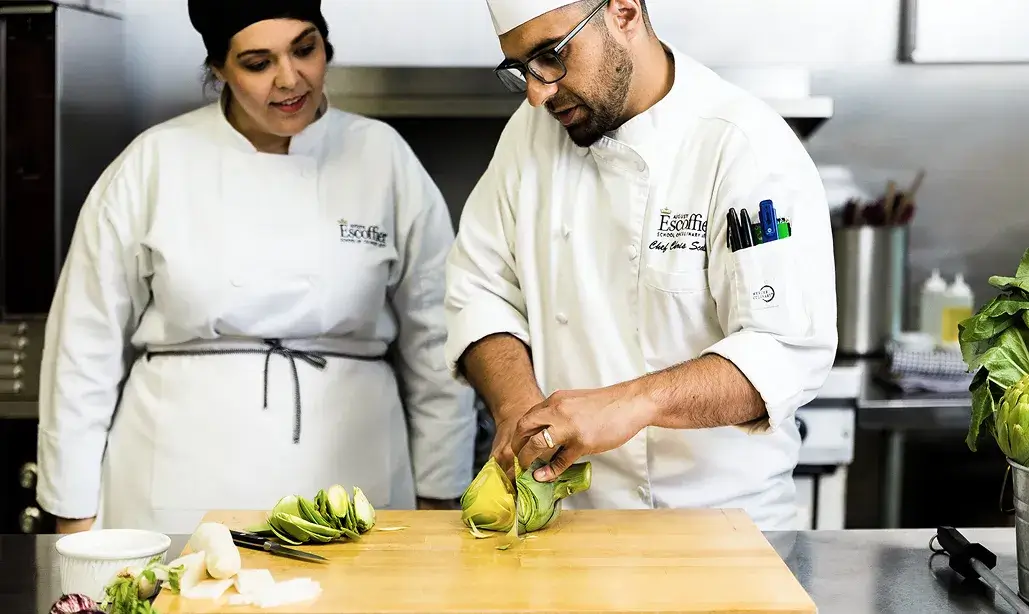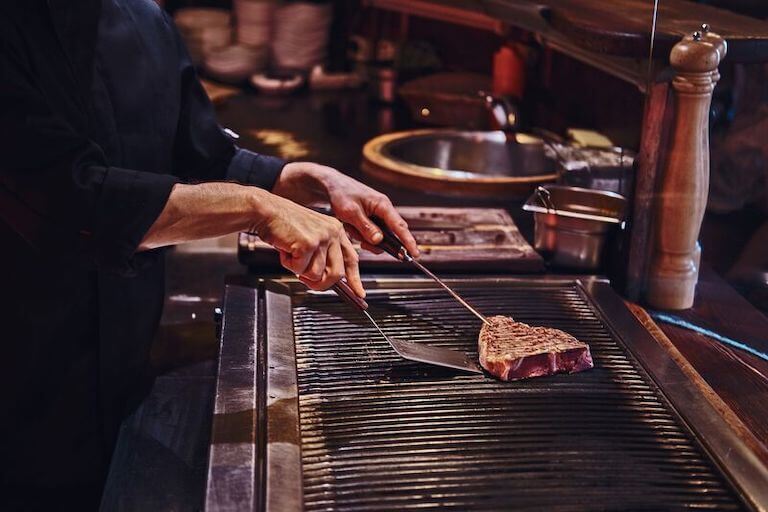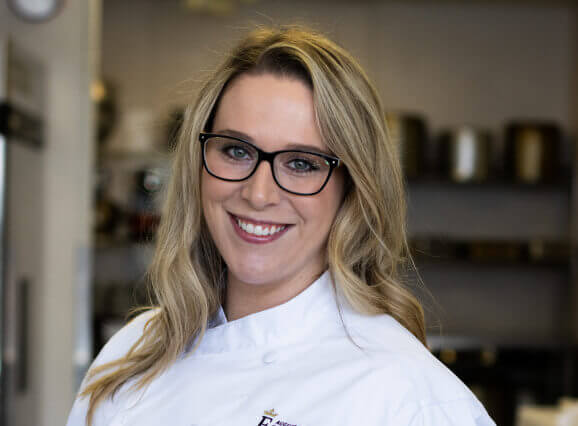Listen to This Article:
If you think culinary school is the next step for your future, you may be right. But which program should you choose–a diploma or an associate degree? Ultimately, the right choice for you depends on your personal and professional goals.
It helps to know exactly what education and opportunity each path can offer. To guide your decision-making, let’s take a look at the difference between an associate degree and a diploma from culinary school.

Students can work alongside Chef Instructors to practice culinary techniques and theory.
What’s the Difference Between an Associate Degree and a Diploma?
There are several differences between diplomas and associate degrees. In general, diplomas may be earned over a shorter period of time and cover a specific set of skills. Comparatively, associate degree programs typically last longer and go more in-depth on topics, teaching both the practical and theoretical skills involved in a given subject.
At Escoffier, students can earn both a diploma and degree, on ground campuses or 100% online. Whether on-campus or online, both programs include a hands-on industry externship. Let’s take a closer look at the differences in diplomas and degrees within the culinary field.
Going to Culinary School: Associate Degree or Diploma?
Culinary students may choose between earning a diploma or associate degree in almost every program offered at Auguste Escoffier School of Culinary Arts, with the exception of Hospitality & Restaurant Operations Management, for which only an associate degree is offered.
Consider the following factors that could impact your decision about pursuing an associate degree or diploma from Escoffier:
Program Duration
The time required for a diploma and degree varies based on the chosen discipline. The duration of an online program also differs from on-campus program lengths. With a few exceptions, diploma programs can be completed within 30 weeks on-campus, compared to the 60-week associate degree program.
Depth of Study
Students can gain practical skills and experience in both programs, but the scope of each option differs. Culinary diploma programs focus on hands-on skills and kitchen classes. Associate degree programs can include these hands-on skills and build upon them, also covering the business and operational skills involved in running a food business.

Externships can provide hands-on opportunities in a working kitchen.
Externships & Experience
Escoffier requires diploma students to complete one six-week externship, and associate degree students to complete two six-week externships before graduation. During this time, culinary education can meet reality as students engage in short-term work in their field of study.
Where traditional internships may last for months and encompass a wide range of tasks, these hands-on industry externships can offer intensive, closely focused opportunities to apply classroom learning in a real-world environment.
How to Pick the Best Program for You
If your choice isn’t immediately clear, there are three steps you can take to guide your decision between a diploma or an associate degree.
Identify Your Interests
Knowing the topics and careers that interest you can guide your decision between a diploma or associate degree, and within those programs, it will help you define your niche. If you have a mind for business and an interest in starting your own, Food Entrepreneurship might be right for you. Likewise, if you love testing recipes and refining your next dish, Culinary Arts might be your best fit!
Define Your Goals
Any level of culinary school can be helpful for achieving your career goals. Still, the extent of your education can play a part in qualifying you for the job of your dreams. Consider what your ideal role is. What skills will it take to land it?
If your end goal is to lead or start a business, an associate degree may better equip you with the business acumen to do so. On the other hand, if technical skills in the kitchen are all that stand between you and your professional goals, a diploma may offer exactly what you need. Take some time to define your ultimate career goal before deciding which program to pursue.
Assess Your Skills
If you have a business background, but lack the kitchen skills to make your goals a reality, then a diploma program may be what you need to round out your skill set for the next step of your career. Maybe you are looking to build skills in the kitchen, but also need the business knowledge to back it up. In that case, a culinary associate degree could be the best option for you to develop a deep, well-rounded knowledge of the culinary industry.
Such was the case for Escoffier graduate Katie Harris. After completing an Associate of Occupational Studies Degree in Baking and Pastry, Katie successfully started her own bakery, Amazing Grains Bread Co. She says Escoffier’s degree program helped her accomplish her dreams of owning a bakery.*
*Information may not reflect every student’s experience. Results and outcomes may be based on several factors, such as geographical region or previous experience.
You can take inventory of your current skills, identify those you still need to develop, and find your niche by exploring the courses involved in each program option.

Online students can receive high-quality, live instruction and support.
Don’t Forget Flexibility!
The best part of pursuing a culinary education? It can be a flexible process.
If you are interested in a diploma, but not yet ready to commit to an associate degree program, it’s not necessary to decide immediately. No time is lost by completing your diploma first. In fact, those who first earn a Culinary Arts Diploma at Escoffier, for example, can later start toward an Associate Degree in Culinary Arts with credit hours and course knowledge already under their belt.
When you’re ready to talk to someone about the next steps in your culinary education and career, Escoffier experts are here to help.
READ MORE ABOUT THE CULINARY EDUCATION OPTIONS AVAILABLE TO YOU:
- Escoffier 101: Everything You Need to Know About Culinary School
- How Much Can Culinary School Cost and How Can You Pay for It?
- Financial Aid Glossary: 36 Terms You Should Know Before Culinary School
*Information may not reflect every student’s experience. Results and outcomes may be based on several factors, such as geographical region or previous experience.



